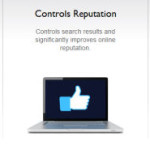Many companies have Google reputation problems that are not of their own making. To their immense dismay they find that out-and-out lies and half-truths about their business or products and services have been posted on their main pages. The person who has posted this may be a disgruntled ex-employee or even a former client, a current rival or some impulsive blogger or internet freak and this negative stuff may appear on the first page in Google search results and thus be potentially harmful for their business and brand.
This negative publicity is usually anonymous. Names are frequently not attached to these negative blog posts, forum threads and sometimes entire websites. It’s thus almost impossible to track down the source of the posts. And the ease with which you can get active on the social media networks means that anyone with the slightest grudge against you can use it to vent his frustration there.
 So what do you do if you experience this situation? The answer is good online reputation management. It’s not a quick and easy solution to a potentially harmful state of affairs but with a bit of patience, you can clean up this mess and regain your good Google image. In this post I’ll examine the major factors that affect online reputation management, including preventive and remedial measures. You must note that the process of securing your online reputation starts before it gets tarnished. To keep your reputation intact, there are certain things you – or your employees — must not do before you go full steam ahead in your online marketing business.
So what do you do if you experience this situation? The answer is good online reputation management. It’s not a quick and easy solution to a potentially harmful state of affairs but with a bit of patience, you can clean up this mess and regain your good Google image. In this post I’ll examine the major factors that affect online reputation management, including preventive and remedial measures. You must note that the process of securing your online reputation starts before it gets tarnished. To keep your reputation intact, there are certain things you – or your employees — must not do before you go full steam ahead in your online marketing business.
Preventive Medicine
As they say about some diseases, ‘prevention is better than cure,’ so it also is with your online reputation. At the outset, don’t post unbelievable stuff like, ‘This soft drink will help you live to a ripe old age’ or ‘Our medicine will surely cure your cancer,’ or a sexist statement like ‘Men can cook better than women’ – and so on. If you do this, you will cause harm to yourself which you probably will never be able to undo. If you restrain yourself, you won’t have to solve any problems that may crop up later. Whether it’s your blog, website, social media site or any other medium online, steer clear of racism, extremisms, generalizations, disturbing comments, aggressive or hard-to-believe statements.
Don’t do Stupid Things
In our Internet age, there’s always the temptation to slip in something stupid online, in the mistaken belief that it’s funny when it can actually bring you and your business into disrepute. Remember, there are millions of eyes watching what you post and they won’t allow you to get away with it. Put consumers first and clean up any dirty business tactics that you may have.
Be Transparent
Ironically, in this world of super information technology, many things that are posted online are being misunderstood. So you have to be completely clear about what you post on the net or it will be misinterpreted or misunderstood leading to a lot of negative publicity for you. A classic example is a tweet that is so badly constructed that it conveys a meaning that is quite contradictory to what you meant it to be.
How to Tackle the Malaise
 Management of your online status involves a multi-pronged, systematic approach that incorporates many actions. First you must mark out the websites and pages where the negative content is and which are ranking for vital keywords that may have your name, your company’s name or names of your key employees.
Management of your online status involves a multi-pronged, systematic approach that incorporates many actions. First you must mark out the websites and pages where the negative content is and which are ranking for vital keywords that may have your name, your company’s name or names of your key employees.
Next, check out the ranking authority of those pages and sites. In this way you’ll know what tools and efforts you’ll require to get them off the first page listing of the major search engines. However, it’s pertinent to note here that it’s tougher to remove a series of negative content on social networking sites than one blog on a domain that is non-authoritative.
Thirdly, get the tools together and carry out your online reputation salvaging campaign. Your optimization tools will include press releases, social media profiles, network of opposing sites and blogs and social bookmarking programs. Your salvage operation may also include heavy content syndication to build top quality links. An SEO expert will have these tools at his disposal.
Best Online Management Tools
Here are some of the best tools to use to manage your online reputation:
Trackur: Use Trackur to see what people are watching when they search for you on social media networks. This tool also enables you to know if the persons concerned are (or are not) authorities in the industry. Trackur gives you a trial period of 10 days.
Brandwatch: A very popular tool for online reputation management, it’s best for social network management. You can monitor specific keywords on social media sites with this tool which allows you a free demo.
Technorati: Use Search Technorati to find specific keywords and your blog mentions on all other blogs. Subscribe to Search Technorati results feed to get notifications of new mentions.
Track Q&As : If people are asking questions related to your company, you, or some specific keyword, you can keep track of them on some Q&A sites such as Yahoo Answers, Quora. If you do an advanced search for a specific keyword and subscribe to the RSS feed which is at the foot of the page it will enable you to track future mentions.
Rankur: Small companies can make good use of this tool, which offers plenty of demographic and analytics information. It comes in many languages and helps you to monitor your rivals and see online reviews. It has a free plan too.
Naymz: This free tool will tell you your RepScore which is measured by your social influence and what people feel about your brand.
SocialMention: The best thing about this free tool is that it can send alerts for all of your keywords and analyze when your brand is mentioned and precisely how important those mentions are.
Google Alerts: Track blogs, Web results, videos, news and groups. Subscribe for Google Alerts through a feed or by email.
Yahoo Alerts: With Yahoo Alerts you can track news by keyword, local news, stocks, feeds and more. Get notifications by e-mail, mobile or Yahoo Messenger.
Twitter Search: With Twitter Search you can search mentions of a specific keyword on Twitter. You’ll find a vast range of search parameters that allow you to search by dates, location, links, sentiment, a specific person and much more. You have to subscribe for this tool.
Now let’s check out some other ways to rectify or prevent your online reputation from being damaged.
Positive Press: It could be costly, but hiring a PR firm to get terrific write-ups for your brand in the media can be very helpful. Authentic articles in reputed newspapers rank high and fast in Google. If you find it expensive, try and do it yourself. It will take time but it’s certainly worth trying out. Something topical/unique that pertains to your business and written in 250-odd words can be sent to editors, along with a short email requesting for publication.
Update Content Regularly: Regularly update the reputation control sites that you build to manage your online reputation. They must be attention-grabbing and sensible articles that are also unique and readable. Write new content on a monthly basis at least, though weekly will be the best and add your brand name in them but don’t overdo it.
On Social Media
Like your online reputation, you also have to protect your image/brand on the social media networks. Let’s see the reputation management aspect on these networks.
Linkedin: LinkedIn is the most alert and professional of all the social networking platforms. You won’t find whimsical statements or hasty, reactive ones the likes of which abound on social media. Your reputation will stay intact here. It’s the idea place for your company news and statements as well as a great place to be followed and follow.
YouTube: On YouTube content can spread like wildfire. However, you can switch off comments and its analytics software enables you to see the blogs that link to your content so you can swiftly recognize from where the negative traffic is coming and take remedial action.
Facebook: On Facebook, groups and business pages can be very easily controlled and monitored. The site has good inbuilt analytics; thus, performance can be tracked. Facebook’s search facility helps easy location of negative spots which can be contacted and appeased.
Pintrest: Pintrest’s a terrific way to convey your company’s culture via visuals in an environment that’s friendly and controlled.
Summing Up
Online reputation management is a subject that has largely been ignored by corporate communications departments of businesses for many years. Generally PR people think that not much can be done to improve an aggravated situation – if such a situation exists – and they mostly wish it away. But, as we have seen in this post, much can be done if you expend time, money and hard work on it. It isn’t easy and it surely is not simple. But for big name brands high-ranked negative comments can cause an upheaval in their business. So it’s always better to take corrective action than to ignore or endure it.








Comments are closed.